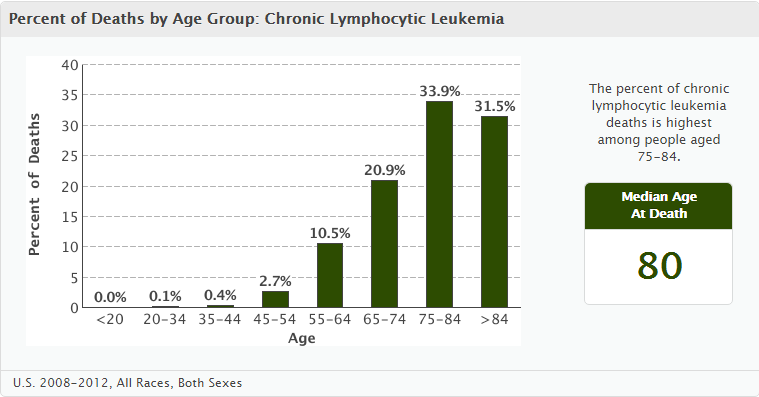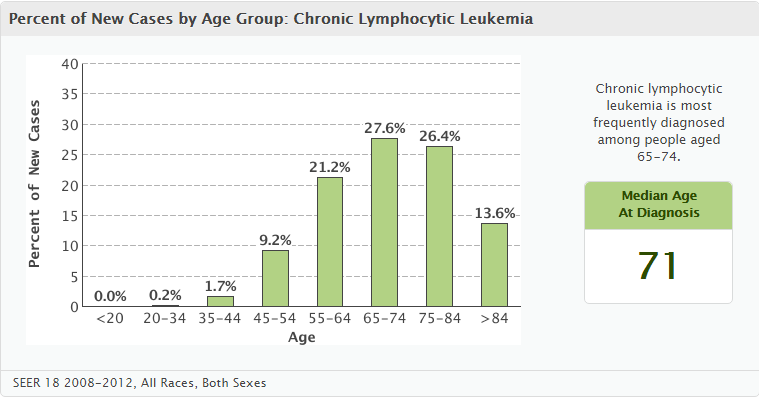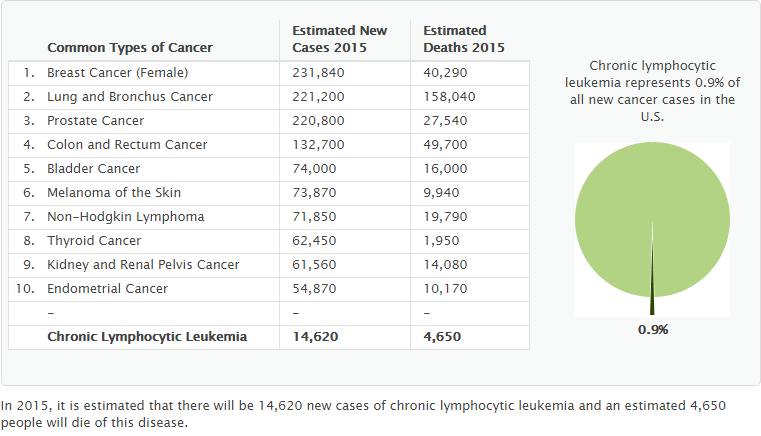Chronic lymphocytic leukemia epidemiology and demographics
|
Chronic lymphocytic leukemia Microchapters |
|
Differentiating Chronic lymphocytic leukemia from other Diseases |
|---|
|
Diagnosis |
|
Treatment |
|
Case Studies |
|
Chronic lymphocytic leukemia epidemiology and demographics On the Web |
|
American Roentgen Ray Society Images of Chronic lymphocytic leukemia epidemiology and demographics |
|
FDA on Chronic lymphocytic leukemia epidemiology and demographics |
|
CDC on Chronic lymphocytic leukemia epidemiology and demographics |
|
Chronic lymphocytic leukemia epidemiology and demographics in the news |
|
Blogs on Chronic lymphocytic leukemia epidemiology and demographics |
|
Directions to Hospitals Treating Chronic lymphocytic leukemia |
|
Risk calculators and risk factors for Chronic lymphocytic leukemia epidemiology and demographics |
Editor-In-Chief: C. Michael Gibson, M.S., M.D. [1]; Associate Editor(s)-in-Chief: Raviteja Guddeti, M.B.B.S. [2]; Rim Halaby, M.D. [3]; Haytham Allaham, M.D. [4]
Overview
In 2011, the age-adjusted incidence of chronic lymphocytic leukemia was 4.82 per 100,000 individuals in the United States.[1] Chronic lymphocytic leukemia is a disease of the elderly and is rarely encountered in individuals under the age of 40. Most patients who are newly diagnosed with chronic lymphocytic leukemia are over the age 50 years.
Epidemiology and Demographics
Prevalence
- The prevalence of chronic lymphocytic leukemia ranges from a low of 10 per 100,000 patients, to a high of 50 per 100,000 patients with an average prevalence of 30 per 100,000 patients.
Incidence
- The incidence of chronic lymphocytic leukemia in developed countries is 4 per 100,000. It increases to more than 30 per 100,000 at age 80 yrs.
- In 2011, the age-adjusted incidence of chronic lymphocytic leukemia was 4.82 per 100,000 individuals in the United States.[1]
Age
- CLL is a disease of the elderly and is rarely encountered in individuals under the age of 40. Most (>75%) people newly diagnosed with chronic lymphocytic leukemia are over age 50. Thereafter the disease incidence increases with age. Of note, subclinical "disease" can be identified in up to 7-8% of individuals over the age of 70. That is, small clones of B cells with the characteristic chronic lymphocytic leukemia phenotype can be identified in many healthy elderly persons. The clinical significance of these cells is unknown.
- While the overall age-adjusted incidence of chronic lymphocytic leukemia in the United States between 2007 and 2011 is 4.4 per 100,000, the age-adjusted incidence of chronic lymphocytic leukemia by age category is:[1]
- Under 65 years: 1.4 per 100,000
- 65 and over: 25.2 per 100,000
Gender
- Chronic lymphocytic leukemia is more common in males, where two thirds of the patients are males.
- In the United States, the age-adjusted incidence of chronic lymphocytic leukemia by gender on 2011 is:[1]
- 6.44 per 100,000 among males
- 3.51 per 100,000 among females
Race
- Chronic lymphocytic leukemia usually affects individuals of the Caucasian race. African American individuals are slightly less likely to develop chronic lymphocytic leukemia.[2]
Gallery








References
- ↑ 1.0 1.1 1.2 1.3 1.4 Howlader N, Noone AM, Krapcho M, Garshell J, Miller D, Altekruse SF, Kosary CL, Yu M, Ruhl J, Tatalovich Z,Mariotto A, Lewis DR, Chen HS, Feuer EJ, Cronin KA (eds). SEER Cancer Statistics Review, 1975-2011, National Cancer Institute. Bethesda, MD, http://seer.cancer.gov/csr/1975_2011/, based on November 2013 SEER data submission, posted to the SEER web site, April 2014.
- ↑ 2.0 2.1 2.2 2.3 2.4 2.5 2.6 2.7 2.8 SEER Stat Fact Sheets: Chronic Lymphocytic Leukemia. National Cancer Institute (2015) http://seer.cancer.gov/statfacts/html/clyl.html Accessed on October, 12 2015
![An image depicting the observed incidence of Chronic lymphocytic leukemia by gender in the United States between 1975 and 2011.[1]](/images/6/66/Incidence_of_lymphocytic_leukemia_by_gender_in_USA.PNG)